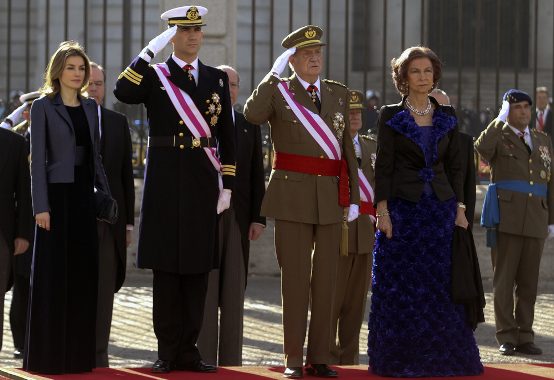Why Spain’s Monarchy Could Fall Along With Its King

When Queen Beatrix of the Netherlands and King Albert II of Belgium abdicated last year, royal succession went on more or less according to procedure, without any large-scale demands for abolishing the monarchies. Even last year’s most controversial European abdication, the resignation of Pope Benedict XVI, proceeded from pope to pope as calmly as could be expected. So why is the abdication of Spain’s reigning monarch of 39 years, Juan Carlos, inspiring young protesters to drape a pre-Civil War Spanish Republican flag over a guillotine and demand a referendum on the monarchy?
The event’s logistics indicate the answer. When King Juan Carlos announced his intention on Monday to abdicate in favor of his son, Felipe, the Spanish Parliament immediately had to begin scrambling to put together a legal and constitutional framework to administer the change. The absent mechanics are a reminder of just how young the reinstated Spanish monarchy is, and just how central parliamentary democracy has come to be to Spanish self-conception.
Juan Carlos became one of the world’s most beloved monarchs after he saved Spanish democracy in 1981 by publicly denouncing, and so defeating, an attempted right-wing military coup. The king’s inability to survive revelations of philandering, extravagant elephant-hunting, and family financial fraud seems odd, then, given the scandals that have plagued but not defeated other European monarchies (such as the late ’90s tabloid frenzies over British royalty). But the Spanish monarchy lacks both the British monarchy’s longevity and its non-ceremonial powers that, however minimal, lend credibility to the institution. If Spain’s monarchs are considered more disposable, it is because Spain has centuries of practice in disposing of them.
Republicanism and monarchy have contended for domination of Spain, with interruptions for military dictatorships, since the First Spanish Republic was proclaimed in 1873. Juan Carlos himself was plucked out of exile during Francisco Franco’s dictatorship after the Spanish Civil War, explicitly fought between Republicans and Nationalists (monarchists without a monarch). The ongoing protests show that these tensions are still unresolved.
But as Noah Millman has pointed out, a perhaps even more distinguishing feature of the Spanish monarchy is its relative powerlessness.
You have to ask why a monarch would be particularly good at occupying his particular square without also possessing significant temporal power. At which point you need to start looking at how a particular society and political system evolved. King Juan Carlos I of Spain was able to preserve Spanish democracy in 1981 because of the ideology of the coup plotters compelled them to respect the orders of their crowned king. His predecessor, Alfonso XIII, provides an excellent illustration of how a clueless monarch can help lead his country to ruin – and wind up getting himself deposed. Meanwhile, Juan Carlos I himself is no longer as secure in his place at the head of the state as he once was, and his status as monarch has no limited numinous power to help him keep that place.
Monarchy as a form of government relies strongly on tradition and power, but it also relies on a sense of national unity and the felt need for a uniting figure. Spain lacks that impulse more than any other contemporary European monarchy. The growth of independence movements in politically and economically powerful regions like Catalonia that maintain their cultural and political autonomy from the Spanish state speaks to this. (Catalan separatists, for their part, seem ambivalent about the monarchy only because their priority is not a rethought model of the Spanish state, but rather independence from it altogether.)
If Felipe is to maintain his father’s reborn institution, he will need to appeal to the one feature monarchs seem to be able to rely on: unquestionable personal conduct. The already well-liked Felipe is better suited to projecting solidarity with an economically suffering Spain, lacking his father’s fondness for extravagant excursions. His wife, former news anchor Letizia Ortiz, and their adorably photogenic children already have journalists calling the couple “middle-class” monarchs.
As for remedying Spaniards’ concerns with royal corruption, Lisa Abend at Time recommends a series of transparency measures, and the public assurance that Felipe’s “sister and brother-in-law, if found guilty, face the same punishment of any other Spaniard.” Columnist Antoni Gutiérrez-Rubí, writing for Spanish newspaper El País, argues that would not be enough, and Felipe must also duplicate, and improve upon, his father’s turn to democracy by demanding a referendum on the monarchy itself as a condition of his ascension.
The challenge is fundamentally that European monarchies to do not tend to survive the advent of republicanism, no matter how many revolutions and dictatorships (as in neighboring France and Portugal) it takes to finish off the royal mode. In order to preserve the only monarchy in southern Europe, Spain will have to deviate from their neighbors’ precedents, and a royal referendum would certainly fit the bill. But in the face of structural weakness, historical uprooting, and national fracturing, Spaniards may decide the monarchy is not worth preserving after all.